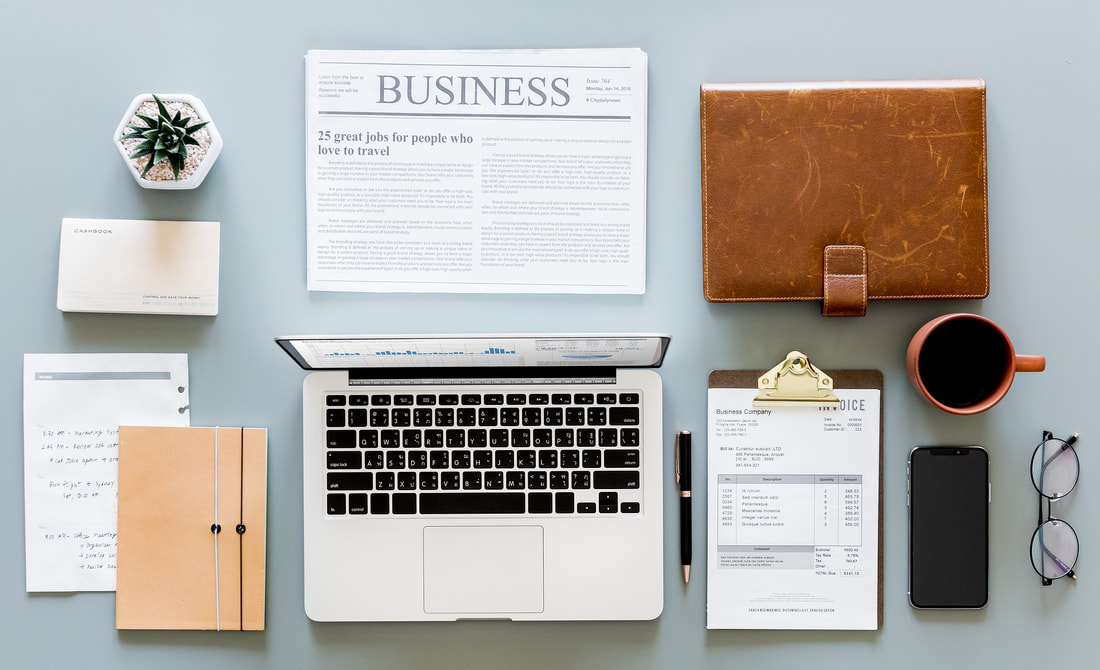|
Many studies have been done on the benefits and importance of having a work-life balance. You can read more about the benefits here: The importance of work-life balance. For now, I want to share with you my thoughts on work-life balance.
Some of you may know from my previous posts that I worked in the fast food service industry for about ten years. During those years, I worked extremely long hours (twelve hours plus most days) and about six days a week. I never really had a break from work. In fact, I often got calls from work while off work. To say work consumed my life is an understatement. I didn't complain about the excessive overtime I was doing because I believed it was my responsibility and accountability being part of management. Do I regret all the extra time I spent in my previous role? No. Definitely not. I was passionate about what I did. After ten years though, I knew I was drained and needed change. I now work for a company that allows me to have a work-life balance. Having finally experienced balance, I can honestly say I agree with all the studies out there claiming work-life balance is important. Below are my top four reasons why work-life balance is important to me! I Only Have One Life How often do you hear yourself saying no to a family member or friend because of overtime? How often do you tell yourself “when I have time, I'd like to do this”? I know from my experiences I said those words one too many times. I know I missed out on many opportunities, events and experiences because of my devotion to work. I get it now. I only have one life to live and I intend to live it to the fullest. What about you? I Enjoy Work Working for a company that values work-life balance makes me enjoy work a lot more. I feel valued as an employee because I know my company sees me as more than a paycheque. My team takes care of me; my personal and overall well-being matters to them. Overall I feel happier and am more productive at work. I Am Balanced I hate the feeling of being burnt out. In my previous job, I felt burnt out and stressed all the time. Even though I trained myself to stay mentally alert and perform, even when my body needed a break, I was becoming depressed and starting to hate my job. After I left that job, I felt a complete and much needed 180. I am now well-rested and a lot happier. I have time to stay active and keep my energy high. I feel as productive with my personal life as I do with my work life. I smile more, and I know my body is appreciating me for this change. Love thy self-right? I Build a Stronger Connection With My Family and Friends When I was perpetually burnt out and unhappy from my previous job, I unleashed anger onto the closest people around me. This was toxic and damaging to my relationships. Work-life balance brings me closer to my family and friends. I no longer take out my mood swings on them because of work. Instead, I am allowed more time with my family and friends. This means more time for family gatherings and adventures with my friends! So, those are my top four reasons why work-life balance is important to me! If you are a workaholic like I was (and still am), it may be time to ask yourself how important is work-life balance to you? Reflect on your current situation. Are you happy? I understand work-life balance looks differently for everyone. I recognize people are at different stages of life -- which may or may not allow for a work-life balance. I believe that for whatever reason you cannot do it now, remember to give yourself a timeline. You deserve balance. Bye World! Serena
0 Comments
In my previous role, I worked for a large, international company who employed thousands of people worldwide. It offered great benefits, great work life balance and the people I worked with were fun and sociable. As much as I enjoyed working at the company, a year and a half into working there, I found myself unsatisfied.
Because the company I worked for was fairly large, all the roles were quite specialized. There was a person hired for each function, so I felt like I was doing the same thing day in and day out. This might not be a bad thing for some people, but I personally like diversity in my work. This was the first thing I felt dissatisfied with. I’m sure not all large companies are this way, but the majority of large companies are because this makes operations smoother and more efficient. The second thing I started to question was my growth in the company. I think a lot of people who work in large organizations think about the likelihood of a promotion given there are so many people competing for the same spot. Competition isn’t a bad thing and if it’s a position that you really want, it shouldn’t discourage you from working for it and making that your goal. My situation though, was that I didn’t want the next promotion. The next role was a supervisory role, and it wasn’t what I wanted for myself long term. I wanted the role that came with the next 2 or 3 promotions - which was a training position. I know, I know. I can’t expect to skip a few steps because I’m afraid of hard work, but I thought about the time investment versus the reward, and to me, it wasn’t worth it. I knew that I would be ready for that ideal promotion in just a year or two, but because of how the company was structured, there were extra levels I needed to be promoted to before I could get there. In large companies, it’s common to have so many levels (). You have your junior staff, intermediate staff, senior staff, specialists, managers, departmental heads, VPs, executives, etc etc. In smaller companies, the structure is much flatter and it’s possible to achieve your goals faster. The third reason I wanted to work for a smaller company was because I wanted to make a difference. When I worked for large companies, even though the work I did was helping our customers, I felt like I was just a cog in a machine. This might be my ego talking, but I wanted to feel important. I wanted to feel like I was an integral part of a team, that I was making a difference by being there - and in a large company, no matter how strong of a performer I was, I never quite got that feeling. Don’t get me wrong, there’s absolutely nothing wrong with working for a large company. There are tons of benefits (as I pointed out earlier), but it just wasn’t right for me. The things I talk about here are characteristics I value deeply in a job and career. Changing jobs and careers shouldn’t be taken lightly, but the best indication of whether or not you should start looking, is asking yourself if you’re truly happy where you are. By the way, I used to work as a recruiter for 3 years. If you want to ask a questions about your job search, resume, interviewing skills or anything of the kind, leave a message below or shoot me an email ! Bye World, Angela  I recently caught myself feeling apathetic towards one of my female managers. I hate to admit this because I am a feminist; I believe men and women are equal, and in the workplace they should be judged based on their actions and abilities. This seems pretty obvious and straightforward, but in the real world, we don’t always act based on our beliefs (read why that is here). So, when I had these feelings of apathy, I asked myself one question - the single question I always ask myself when I have a negative feeling about another woman. “In this situation, how would I feel towards this person if they were a man”. This question is my check against inequality between men and women. It’s simple and effective. Let me show you what I mean. I report to two men and one woman. My Managers and I communicate a lot through instant messaging and one day, my female manager was being particularly blunt in the messages. Usually she would be quite casual using “haha’s” and emojis, but this day, she did not. I felt like she was very short with me and I couldn’t think of anything I had done wrong, or differently. To be honest, I held some negative feelings toward her for the rest of the day, and probably a few days after. I finally snapped out of it when she and I had a casual lunch room chat and she was back to being as friendly and positive as she normally is. At this time, I thought to myself “would I have felt this way if it were one of my male managers who suddenly became “short” with me”? The answer was no. I looked back at the chat history between my female manager I and realized that if it were one of the other 2 male managers who used the exact same language, I wouldn’t have given it a second thought. Then I thought she may have been short with me because she was tired or stressed, or a number of other reasons, and then I stop myself again. If it were one of my male managers, I wouldn’t even bother to justify their being short with me, so why do I need to for my female manager? I hate realizing my unfair biases, but I’m also happy that I have the ability to realize them because many people don’t. Anyone can easily fall into these societal inequalities and the more we catch ourselves doing these things, the closer we get to equality. It’s not fair that I expect my female manager to be “nicer” and more “pleasant” than my male managers. Do we expect too much of women? Or do we not expect enough of men? I can think of countless other times where I had to pause and ask myself the question, “In this situation, how would I feel towards this woman if they were a man”. I can also think of countless times where I was on the receiving end, and was being treated like the bad guy because I wasn’t as “nice” or “pleasant” as other people expect me to be. For example, I’m usually the one at a group outing organizing and telling people what to do and where to do it. People who don’t know me just think I’m bossy, but in reality, I just really like efficiency and hate wasting time. If I were a man, people would applaud me for getting s*** done. So, What to do about it? My call to action is simple.
If you have a story to share, please tell us in the comments below. We would love to hear it, truly! Bye World, Angela How many of you feel like there are too many things to do all the time and there never seems to be enough time, especially at work? I do!
I work in an office environment. I have a daily routine and have an ideal plan for how my day will start and end. Of course, plans always change and unexpected tasks or assignments come up. In these situations, my outlined plan is thrown out of the window. I find myself trying to multitask way too many tasks all at once and not enough time to do it all. At the end of the day, I either stay a little later to complete it or try to start my day earlier to finish it off. These situations drain me mentally and sometimes effects my personal life. Of course, in certain situations such as meetings or starting a new position you may tag on some extra hours of work. But how often do you ask yourself whether you are making your work hours productive? Are you just cramming all your work and mindlessly working hoping to get as much done as possible? Is this really the expectation of your job? Some would say, yes, because it could be part of the nature of your career. If not, why are you in this situation? Even so, do you ask yourself, “Could I make the day more productive and effective?” By asking myself these questions, I consciously change some of my habits to help me be more productive at work. From my personal experiences, I came up with six things that support me, and I hope that it can help you make your workday more productive. Prioritize Your Checklist My routine starts off with putting my stuff away and getting a fresh cup of hot coffee or tea. Then the first thing I pull out is my to-do list. I review my list and pull out another piece of paper to select my top three to four tasks that I need to focus on and set the original list aside. By not looking at the original list, it helps minimize distractions from other work that are not the top priority, and I feel less overwhelmed. I have two criteria when selecting the tasks: the deadline and the amount of time it takes. My point is by having a realistic checklist, it will help you be more productive with actually getting your work done that is most important. There is a saying that “by doing less, means more.” Time Bound Your Task It is crucial to have a estimated time to complete your task, and you should follow through. For example, at work, I need to enter visitors log sheets into an excel document, and I know it will take me 15 minutes. I time myself for 15 minutes from the time I start. This way I will only focus on one task at and make sure it gets done. If you don't do that, then you will be wasting valuable time that you can use to complete other unfinished work. My point is that it is to manage your time effectively. Put Away Your Phone I quite often leave my phone on my desk, and it could be quite distracting. My phone is usually on silent, but when messages or the notification's light turns on, I’m staring at it like a hawk. Next thing you know, I am checking my messages or checking out social media events. This affects the productivity of my work by disrupting my concentration and waste precious work minutes. I now put my phone away in a drawer. Unless you require your phone for work, put away the phone or limit yourself on phone use. Keep Your Desk Organize Some of you may know what I meant by that: loose papers, stationaries, cups, sticky notes, and random stuff. I find that working at a mess-free desk helps me stay better focused on my tasks. I often organize my office by throwing away unnecessary items and filing away documents that are not needed. I am lucky I have a big desk and plenty of storage space, but for those who don’t, invest in office supplies to help you keep organized. A bright and clutter free desk environment has many benefits such as reducing distractions, keeping you organize and feeling more confident. Which means improvement in your productivity level. Give Yourself Breaks At my workplace, most of my colleagues work while having lunch. I understand that there are many things to do and there are limited hours: however, I find this makes the person even more unproductive because there isn’t time to re-energize. I think it is essential to take your lunch break to recharge and feel refreshed. Also, it is good to take mini breaks, just step away from the desk. You stare at the screen all day concentrated on work, and it could put a toll on your health. Hence why lots of studies, 5 Science-Backed Ways Taking a Break Boosts Our Productivity, tell you to get your butt off the seat and go for your walks. By taking breaks, it helps you be more productive at work because breaks give you the opportunity to reenergize and retackle the task at hand. Drink Plenty of Water How many cups of water do you drink a day at work? Let's be honest, most of us who are working at the desk don’t often leave their seat. If that’s the case, you’re probably not hydrating as often as you should. Try setting yourself a goal to drink a 4 - 8 cups of work during work hours. You could just set the alarm or task reminders to help remind you to hydrate. Drinking plenty of water enables you to stay energize and be alert. I hope these five tips could help you improve your productivity level at work. If not, I am glad I have brought awareness about maximizing productivity level at work to you. Take a few minutes to review those questions above, and I am sure you will find ways to help you. Bye World, Serena Communication. You’ve heard it everywhere, everyone who’s alive has basically said it, and yes, I’m probably beating a dead horse, but I think the reason I want to talk about it still is because there are still millions of people who don’t really ‘get it’. Communication is not just about what you say. It’s a combination of when you say it, how you say it, who you say it to, and the exact words you decide to use. Not only that, good communication also has to be genuine, authentic, and meaningful. When you put all that together, it’s no wonder that lots of people still have a hard time with it. Instead of a Top 10 or 20 list of ways to communicate, let’s break it down and explain some of the whys. Knowing the underlying causes usually helps put things into a different perspective. Words matter. Choose the right ones People don’t usually give this much thought, but the language is very particular. The exact words you use will change the way your idea “feels” and can communicate a different message. Here’s an example to show what I mean. Ex 1) I don’t know, I can ask Ex 2) I don’t know, I will ask Which sentence “feels” like the employee wants to find out the information? If you were a manager, which answer gives you more confidence? Would you rather have someone who will do something, or someone who can do something? It’s very subtle and you may not notice it having a negative effect, but I can assure you that it most definitely does. Here’s a recent excerpt from an interview with a Cognitive Scientist, Lera Boroditsky: “Words have power. If I tell you this hamburger is 80 percent lean as opposed to 20 percent fat, then in some sense I am communicating the same thing. But what people get from those two communications is very different: People perceive the 80 percent lean hamburger as much healthier than the 20 percent fat option. By choosing how you frame and talk about something, you are cuing others to think about it in a specific way. We can drastically change someone’s perspective by how we choose to talk about and frame something.” Choose the words you use with thought and really consider if they are the right ones. Know your audience The company where I work now is the most diverse company I have ever worked for. Out of the 16 people working in my office, there are 12 different countries being represented, only 7 whose primary language is English, and only 15 speak more than 1 language. This has a huge effect on the way I communicate with my colleagues, and how I understand them. Lera Boroditsky also gave a recent TED talk about how language shapes the way we think and gave the example of miscommunication between English and Spanish Speakers. In English, we say “I broke my arm”. In Spanish, this would literally mean I physically tried to break my own arm. In Spanish, they would say “my arm broke”. These small differences make me aware that I need to communicate differently with different people. To minimize miscommunication, I often ask for clarification. Make your message understandable by the receiver Tying in with the previous point, communication is successful when the receiver understands your message, so there are 2 things to consider when communicating something. 1) Is my message clear? 2) Does the receiver have the background to understand the message? For example, I recently started working with the marketing department and I quickly learned that they used language that I was not familiar with. “Copy” means the text on any marketing/communication material, “pantone” is a system of colour matching, and “EPOC” means every point of contact. Sometimes, the person communicating to me knew I did not have a marketing background and would explain what they meant, and other times, the person assumed I know the vocabulary and did not explain anything. Needless to say, when I did not understand the message, things were a bit rocky. Of course I eventually asked or Googled the answer, but had the message been made clear from the start, everyone ends up saving time, and working together easier, and better as a team. So don’t assume another person knows what you know and make sure they understand what you are trying to communicate. It’s better to over communicate than to under communicate When working with a team of people, which I assume many of us are, it’s always good to over communicate. It might not seem obvious, but simple actions involve a lot of work, and if things are not being communicated, the whole process is impacted. Let’s take the simple example of ordering T-Shirts for a team of people who will be at an event. First, you need to know when the event is, then you need to know who is attending the event and what their sizes are. You then need to find out how long your supplier needs to produce the shirts, and then communicate to your designer to create the design by a certain date. If any of the players don’t know the details or the deadlines, it causes a lot of anguish and may result in not getting the product on time. There are a ton more communications that go into this simple action, like making sure your manager knows the deadlines and budgets, the supplies communicates back and forth to confirm designs and prices, updates on time estimates etc. Since everyone is working on multiple projects, if communication isn’t happening, you could feel very stressed! If you feel like you’re asking too many questions and sending out too many reminders, you’re likely doing just the right amount of communication. Just remember that your communications should be relevant, so again, it’s not wasting anyone’s time. Use the appropriate communication style for work We have to understand that communication at work is different from communication elsewhere. There are obviously exceptions depending where you work, but for most of us, work life, is different from personal life, so the communication style needs to be different as well. At home and with your friends, you might be the funny, cheeky guy or you might be the cool, mysterious guy. If you use these communication styles at work, your response to the question “when will you be done the project” might be “wouldn’t you like to know”? Your friends might laugh at this response, but your co-worker who is waiting on your part of the project will not be very impressed. It’s fine to have a personality at work, and being yourself is great, but when it comes to communication, it should be clear and accurate. Tell your colleague what they actually need to know and then make a joke about it afterwards if you must. You may think this is obvious, and can’t imagine people actually behaving this way, but it happens. And if this is you, maybe rethink how you come across at work. Communication is such a rich topic, and there is so much more to know and think about. I hope this article at the very least makes you reflect on your communication style at work. Bye World, Angela I was chatting with a close friend and she was telling me how she and her co-workers don’t usually have lunch together. She said that even though there is a large lunchroom, people choose to eat at their desk. I thought this was interesting because, as I reflect on my current work environment, most of my colleagues and I eat together.
Of course, I get it, not everyone gets the opportunity to sit down and eat at the same time especially if you are not in an office environment— something I can relate to when I used to work in the food industry. Though, when there was a chance, I would most definitely try to. From personal experiences, I have found five benefits to eating lunch with your co-workers. Lunching is Networking Having lunch with your co-workers is an excellent way to build friendly relationships and connections. It is a great time to socialize and gain insights on the company’s challenges, growth, and upcoming changes. Sometimes your co-workers can share thoughts and innovative ideas that could help the business. By building a positive relationship with one another, people will be more willing to cooperate and support each other. In my previous role, I had lunch with my colleagues from different departments almost daily, and, by doing so, I established a positive relationship with many individuals. So when I needed a report this one time from one of the departments, I got it without a fuss and sooner than expected. Career Building If upper management is having lunch in the same room as you, don’t miss out! This is a great way to get to know each other on a more personal level. It is also a great time to leave a good an impression with your bosses because it can lead you to possible future opportunities within the company. Having the skillset to do your job is a requirement, but being the right person for the company is also important. I was working as a temp for my current company for about 1 year and 9 months and now I work there permanently. I have expressed my interest in wanting to work for the company for some time and when there was a vacant position, the management team approached me with an offer ready for me to sign. I would like to say these lunches have helped me land a job with a great organization. Knowledge Building Your co-workers will most definitely add more valuable knowledge to your professional and personal life. Lunch is an excellent time to socialize and get updates on current events. Sometimes shared ideas are generated and can be very beneficial for business improvements. Depending on the work environment, if you have a very diverse group you can gain valuable insights in life. Productivity Booster The majority of us who work full time job can understand that working long hours can be mentally and emotionally draining. By having a set lunch time with your coworkers, this can be a much anticipated and needed mental health break. This benefits the business environment because it encourages better cooperation with one another. Additionally, breaks give people time to re-energized which result in better productivity. Makes You Happier We are humans and we need time to disengage from work as well. Having lunch with your co-workers will allow you to connect with people on a personal level and “let you be you” for a little while. Regardless of job role, people can engage in more casual conversations which leads to happiness. When people are happier, they become more relaxed which helps to foster a friendly work environment. So, the next time you decide to eat at your desk, try grabbing lunch with your co-workers instead. I mean, majority of us spend at least 40 hours a week with the same people, it is like our second home. Use your lunch time to interact with others and take a break. At the very end of the day, you get paid to relax and reenergize! Bye World! Serena  I recently rediscovered a TED Talk that I watched 4 years ago. The talk was given by Meg Jay, a clinical psychologist and writer. It’s based on her book The Defining Decade, Why your twenties matter - and how to make the most of them now. The video had a huge impact when I first watched it several years ago, and when I re-watched it, I realize it’s something worth sharing with all the twenty-somethings out there. I wish I had shared this when I first watched it because most of my close friends were in their mid 20’s then. Better late than never, right? In the 14:49 minute video, Jay addresses professional growth and relationships. I’m only going to discuss the professional growth side in this post to keep it short and sweet. “What do you think happens when you pat a 20 something on the head and tell them you have an extra 10 years to start your life? Nothing, nothing happens” Meg Jay talks about the importance of your 20’s because this is the decade where you set the course for the rest of your life. Yes, you might not need to have your career figured out until you’re 30, but you can’t expect to start from scratch and then all of a sudden be in your dream job at 30 years old. You have to build towards it, and your 20’s is the time to do that. For example, I know I want kids in my early to mid 30’s. When I have kids, I want to have a stable, good and well paying job so I don’t have much to worry about while taking care of a family. Imagine having to go from a starter job at 30 to a managerial job by 33. Around 30 is also the time you are likely planning a wedding and getting married too because that's a typical timeline for marriage these days. Plus, that starter job probably isn’t at your dream/ideal company. So you'll switch jobs a few times before landing something you love. All of that between 30 and 33? Sounds a bit exhausting doesn’t it? Everyone’s timeline is different, so I challenge you imagine where you want to be at age 35 or 40, and really think about the feasibility of your timeline. Here’s how I evaluate my timeline, it’s something I’ve been doing since I was about 22. Whenever I have been in a job for a while, I take some time to think about where I am professionally.
I’m 29 now and in my 11 years of working in full-time, salaried positions, I’ve held 7 different titles and worked for 4 different companies. The first job I had was as a Manager at a fast food chain - not really the role I was hoping for, but it added “identity capital” by giving me managerial experience. With each new position and company I worked for, I gained more identity capital, and I am currently in a job meets all the criteria on my checklist. It’s very likely that I would have gotten where I am now eventually, even if I didn't start making career decisions at 22, but I knew there were certain things I wanted for myself when I was in my 30's and I worked hard to make sure I could have them. “…but that’s what I love about working with 20 somethings, they are so easy to help” If you’re in your 20’s, again, I challenge you to think about your 30’s and where you see yourself. Bye World, -Angela |





